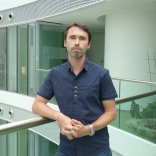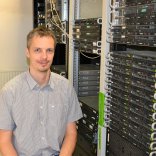At CEITEC, Michal Šmída will deal with identification of new possibilities focusing on the therapy of neoplastic diseases, primarily B-cell malignities such as Chronic Lymphotic Leukemia (CLL). Nowadays, CLL represents in western countries most frequent neoplastic disease of white corpuscles (B-lymphocytes) which are accumulated in blood, bone marrow, lymph nodes and other organs. The research group, led by Michal Šmída, will also develop new cell models which might be used in clinical practice and lead to personalised medicine tailored to specific needs of individual patients with a particular mutation.
Michal Šmída came to CEITEC from the Centre of Molecular Medicine (CeMM) at the Austrian Academy of Science in Vienna. He explains his reasons why he preferred CEITEC to other institutes: “I had been planning my return to the Czech Republic and I got really impressed by CEITEC. I am happy that I can pursue my scientific career just in Brno and CEITEC offers excellent equipment and top-of-the-edge conditions for my research”.
Robert Vácha, who came to CEITEC from the University of Cambridge (England) and from the Lund University (Sweden), focuses on the interaction of proteins and lipid membranes. These interactions play a key role in cellular signalling, transport, and protection. Using computer modelling, Robert Vácha examines how the mutations of proteins and composition of membranes affect behaviour of cells. Changes in this behaviour cause many diseases ranging from cancer and Alzheimer's disease to aging and poor diet. Robert Vácha, the new RG leader, explains: “Molecular understanding of protein-membrane interactions will help us to develop new peptides suitable for treatment of these serious diseases”.
In compliance with CEITEC MU strategy, during opening new job positions CEITEC MU management focuses on the topic of personalised medicine and sustainable agriculture in such way so as the competitiveness of the institute grows stronger at the European scale. The management plans to open an international selection procedure for one junior research group every year. Jiří Nantl, Director of CEITEC MU, explains the system of commencement and termination: “The management focuses on candidates with good prospects standing at the outset of their own scientific career and offers them clearly defined support for their research. Both new research group leaders are junior scientists; their work at CEITEC will be evaluated after four years and the results will show whether they will stay at the institute in the future”.









